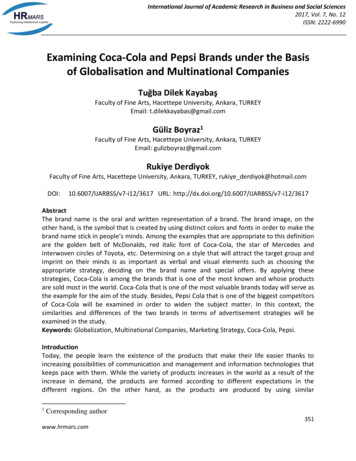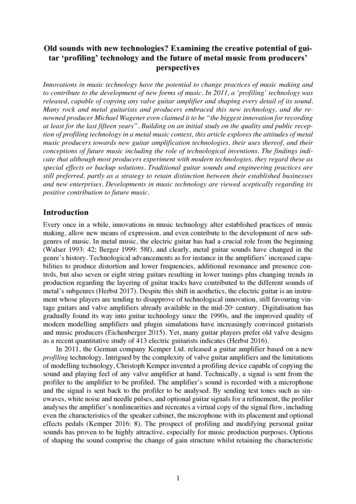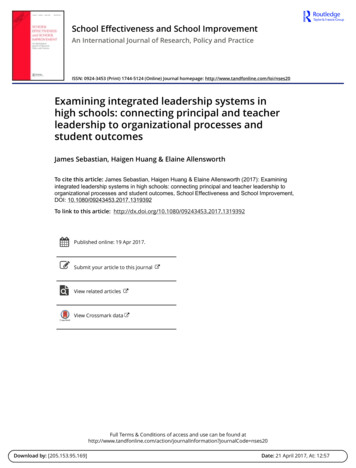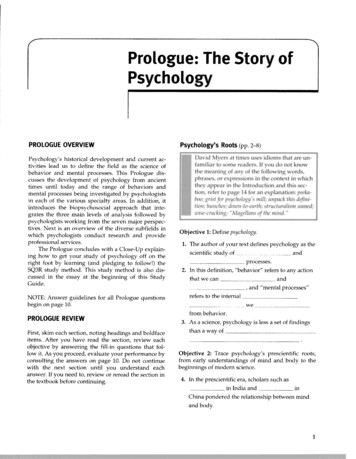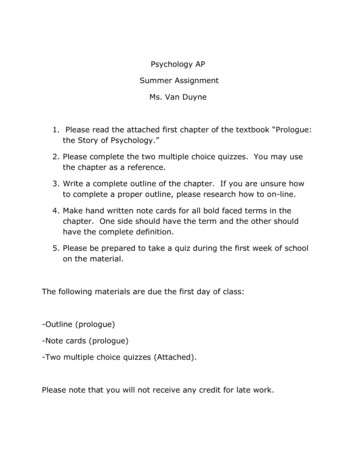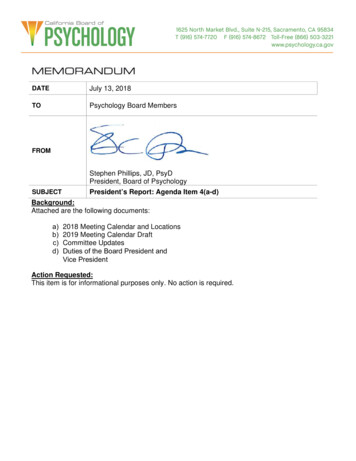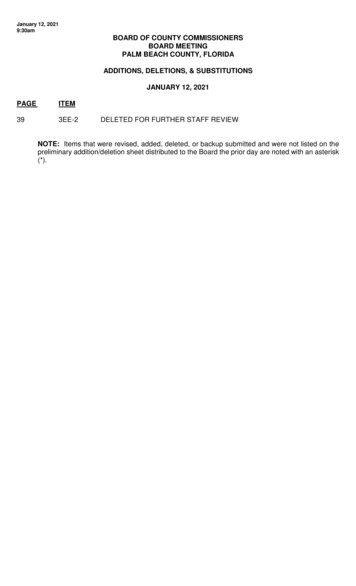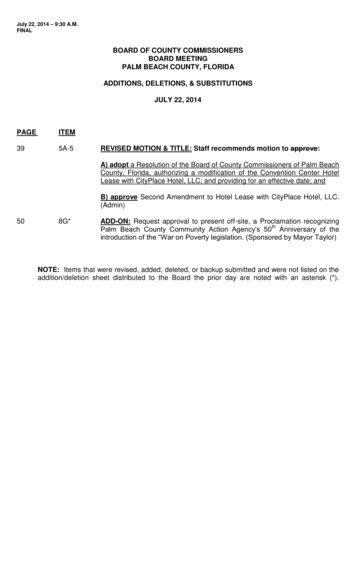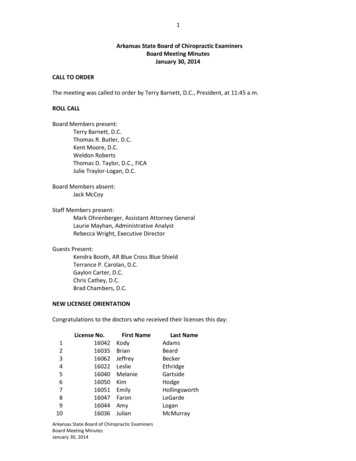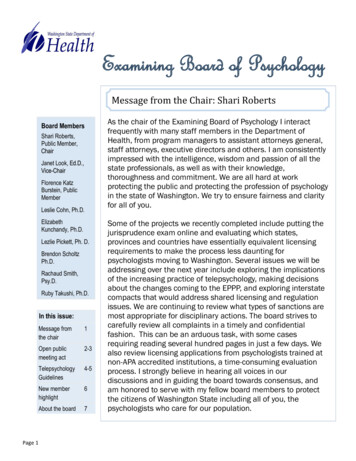
Transcription
Examining Board of PsychologyMessage from the Chair: Shari RobertsBoard MembersShari Roberts,Public MemberJanet Look,Florence KatzBurstein, PublicMemberLeslie Cohn, Ph.D.ElizabethKunchandy, Ph.D.Lezlie Pickett, Ph. D.Brendon ScholtzPh.D.Rachaud Smith,Psy.D.Ruby Takushi, Ph.D.In this issue:Page 1Message fromthe chair1Open publicmeeting act2-3TelepsychologyGuidelines4-5New memberhighlight6About the board7As the chair of the Examining Board of Psychology I interactfrequently with many staff members in the Department ofHealth, from program managers to assistant attorneys general,staff attorneys, executive directors and others. I am consistentlyimpressed with the intelligence, wisdom and passion of all thestate professionals, as well as with their knowledge,thoroughness and commitment. We are all hard at workprotecting the public and protecting the profession of psychologyin the state of Washington. We try to ensure fairness and clarityfor all of you.Some of the projects we recently completed include putting thejurisprudence exam online and evaluating which states,provinces and countries have essentially equivalent licensingrequirements to make the process less daunting forpsychologists moving to Washington. Several issues we will beaddressing over the next year include exploring the implicationsof the increasing practice of telepsychology, making decisionsabout the changes coming to the EPPP, and exploring interstatecompacts that would address shared licensing and regulationissues. We are continuing to review what types of sanctions aremost appropriate for disciplinary actions. The board strives tocarefully review all complaints in a timely and confidentialfashion. This can be an arduous task, with some casesrequiring reading several hundred pages in just a few days. Wealso review licensing applications from psychologists trained atnon-APA accredited institutions, a time-consuming evaluationprocess. I strongly believe in hearing all voices in ourdiscussions and in guiding the board towards consensus, andam honored to serve with my fellow board members to protectthe citizens of Washington State including all of you, thepsychologists who care for our population.
http://www.atg.wa.gov/Open-GovernmentPage 2
Message from Attorney General Bob FergusonGreetings.Transparency in government is a cornerstone of democracy, ensuring the people’s right to know. The Attorney General’s Office is an important resourcefor the public and for government entities on the state’s Sunshine Laws: thePublic Records Act (PRA) and the Open Public Meetings Act (OPMA). My officerecently successfully requested legislation to increase the OPMA’s penalties sothey maintain the deterrent effect consistent with the original intent of the law.The passage of that bill, SB 6171, means that OPMA penalties are increased from 100 to 500 fora first knowing violation by a governing body member, and to 1,000 for a subsequent knowing violation.When problems arise involving these laws, they are often the result of a lack of knowledge. In aneffort to increase awareness, my office provides resources on our Open Government web page.The web page includes links to the Open Government Trainings, the Open Government ResourceManual, and other useful information. In addition, Open Government Assistant Attorney GeneralNancy Krier provides information, technical assistance, and training. Ms. Krier prepared the enclosed document, “Open Public Meetings Act Guidance on Frequently Asked Questions about Processes to Fill Vacant Positions by Public Agency Governing Boards”, also available on our Open Government Training web page.The guidance is intended to assist board and commission members in complying with the OPMA when filling vacant top positions at their public agencies. The guidance also offers the public abetter understanding of their rights under the law.While the FAQ guidance does not bind any agency or person, we hope it will be a useful resource for agencies, the public, and members of the media alike. Our goal is to assist in providing a better comprehension of the OPMA, reducing risks of possible violations and penalties.Thank you for your interest in open government. I hope you find this guidance informative.Bob FergusonWashington State Attorney GeneralIf you have questions or comments, please contact Nancy Krier, the AssistantAttorney General for Open Government at nancyk1@atg.wa.gov.Page 3
Telepsychologyt ofhGuidelineTitle:TelepsychologyReferences:RCWs 18.83, 18.130, and 70.02 RCW, and chapters 246-16 and 246-924 WAC;American Psychological Association’s Guidelines for the Practice of Telepsychology,Adopted July 31, 2013.Contact:Kim-Boi Shadduck, Program ManagerPhone:360-236-2912Effective Date:Approved January 29, 2016Approved By:Timothy Cahn, Ph.D., Chair(signature on file)Email: Kimboi.shadduck@doh.wa.govBackgroundAdvances in technology and changes in how people communicate have made common the delivery ofpsychological services using telecommunications technologies. This approach, commonly referred to astelepsychology, is beneficial if properly used because it may increase access to psychological services,decrease the cost of accessing psychological services, and speed up the delivery of psychological servicesand patient-client records. The Examining Board of Psychology (Board) developed this guideline todescribe how telepsychology will be regulated consistent with existing statutes and rules governing thepractice of psychology in Washington State. The Board recognizes that technological changes occurrapidly, so this guideline provides general principles that are technologically neutral rather than focusing onthe use of any specific telecommunications technologies.Definitions“Telepsychology” is the delivery of psychological services using telecommunications technologies.“Telecommunications” is the preparation, transmission, communication, or related processing of informationby electrical, electromagnetic, electromechanical, electro-optical, or electronic means.“Telecommunications technologies” include but are not limited to telephone, mobile devices, interactivevideo conferencing, email, chat, text, and Internet (e.g. self-help websites, blogs, and social media).Page 4
“In-person” means interaction(s) between the psychologist and the client-patient that occur in the samephysical space, and does not include interactions that occur through the use of telecommunicationstechnologies.“Remote” refers to the delivery of a service or services at a different site from where the psychologist isphysically located. The term remote includes no consideration related to distance.“Practice of psychology” has the same meaning as RCW 18.83.010(1) (a)(b)and(c). “Telepsychology” isincluded within the practice of psychology and is not a separate discipline.Guidelines for Appropriate use of TelepsychologyA. Licensure: Psychologists utilizing telepsychology on patients-clients in Washington State must belicensed to practice psychology in Washington State or have a temporary permit to practicepsychology in Washington State. Washington State licensed psychologists are encouraged to befamiliar with and comply with relevant laws and regulations when providing telepsychology services topatients-clients across state and international borders.B. Standard of Care: Psychologists using telepsychology will be held to the same standard of care aspsychologists providing services in-person, including the requirement to meet technical, clinical,confidentiality, and ethical standards otherwise required by law. Some elements of the standard ofcare as applied to telepsychology include:Psychologists take reasonable steps to ensure they are competent with both the technologies usedand the potential effect of the use of telepsychology on clients-patients and auxiliary staff.Psychologists obtain and document informed consent that specifically addresses the concerns thatmay be related to the telepsychology services they provide. Such informed consent should bedeveloped so it is reasonably understandable to clients-patients. Informed consent may include, but isnot limited to:The manner in which the psychologist and client-patient will use particular telecommunicationstechnologies, the boundaries that will be established and observed, and procedures for responding toelectronic communications from clients-patients;Issues and potential risks surrounding confidentiality and security of client-patient information whenparticular telecommunication technologies are used (e.g., potential for decreased expectation ofconfidentiality if certain technologies are used);Limitations on the availability and/or appropriateness of specific telepsychology services that may behindered as a result of the services being offered remotely.C. Confidentiality of Data and Information: Psychologists practicing telepsychology take reasonablesteps to protect and maintain the confidentiality of data and information relating to their clientspatients. When necessary, psychologists consult with technology experts to augment their knowledgeof telecommunications technologies in order to apply adequate security measures in their practicesthat will protect and maintain the confidentiality of data and information related to their patients-clients.Page 5
New Member SpotlightFlorence Katz Burstein, Public MemberFlorence Katz Burstein (A.B., A.M.) retired in 2015 from the City of Seattle, where she became the Director ofEmployee Health Services in 2007. Her professional experiences were primarily in health services planning andregulation, and in both non-occupational and workers’ compensation health insurance – Connecticut, Maryland,Tennessee and finally, Washington. In addition to serving now as a public member on the Examining Board ofPsychology, she volunteers at Seattle Goodwill.Dr. Lezlie PickettLezlie Anne Pickett owned a successful management consulting/training company for approximately 16 years,while also serving as a Court Appointed Special Advocate volunteer for ten years with the Kind County FamilyCourt System, advocating for children. She then decided to pursue her first true love, forensic psychology, going back to earn a Ph.D. from Central Michigan University in Michigan. Her professional experiences includeworking as a Forensic/Clinical Psychologist for the Federal Bureau of Prisons (United States Penitentiary) inAtlanta, Georgia, and maximum security prisons in Washington State. Currently, she is a Forensic Examiner atWestern State Hospital and also maintains a thriving private practice. She enjoys making plans for vacationsthat she is always too busy to actually take, likes sleeping in (because it so rarely ever happens), and is lookingforward to working with the great team of people who currently comprise the Examining Board of Psychology.Examining Board of Psychology DisciplinaryPsychologistsActive Licensed Psychologists - 2,749Complaints Received - 349Investigated - 179Closed after investigation - 136Legal Action Taken - 40Summary Action - 5The board received an increased number of complaints compared to the 2011-2013 biennium; this caused thenumber of authorized investigations to increase as well.The number of cases resulting in action taken by the board varies slightly depending on the nature of thecomplaints received. There has not been a significant change from previous biennium.When there is an immediate danger to publicHow to avoid a complaint: Communicate and documentsafety, the board may summarily (immediately)all communication and treatment provided orsuspend a respondent’s license. The boardrecommended. These actions alone may not prevent asummarily suspended one psychologist.complaint being filed but will assist the board whenWhen a licensee is prohibited from practicing inevaluating whether a violation of law has occurred. Knowanother state because of unprofessional conduct,your law.there is a mandatory summary suspension of thecredential in Washington. The board has not hadLaws can be located on our website.any of these cases.Page 6
The board is made up of seven psychologists and two publicmembers. Members attend regular meetings,Board Staff ContactInformationscheduled for one day on a Friday every six to eight weeks. Membersare appointed by the governor forDepartment of HealthPO BOX 47852Olympia, WA 98504-7852five-year terms. If you are interested in applying to be a part of theboard, please complete anapplication onKim-Boi Shadduck, ProgrammanagerTammy Kelley, Disciplinary casemanagerCustomer Service 360-236-4700www.doh.wa.govBoard Websitethe governor’s website at ication.asp orcontact Kim-Boi Shadduck atKimBoi.Shadduck@doh.wa.govwith questions.It is the purpose of the board established in RCW 18.83.050 to regulate the competency and quality ofprofessional health care providers under its jurisdiction by establishing, monitoring, and enforcingqualifications for licensure, continuing education, consistent standards of practice, continuing competencymechanisms, and discipline.2017 Board Meeting DatesJanuary 27May 19September 15DOH 668-093 Winter 2016Public Health - Always Working for a Safer and Healthier WashingtonPage 7March 24July 21November 17
about the changes coming to the EPPP, and exploring interstate compacts that would address shared licensing and regulation issues. We are continuing to review what types of sanctions are most appropriate for disciplinary actions. The board strives to carefully review all complaints in a timely and confidential fashion. This can be an arduous task, with some cases requiring reading several .
